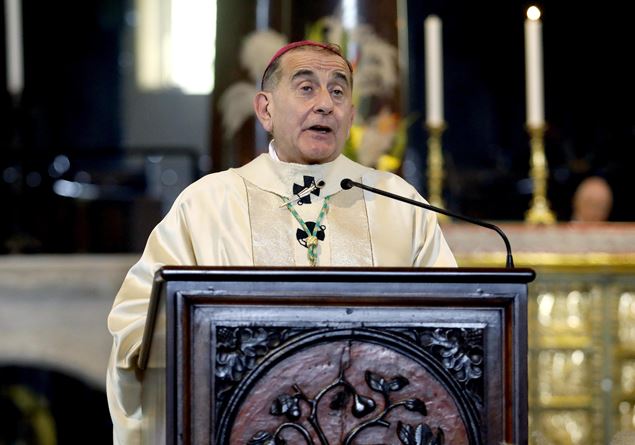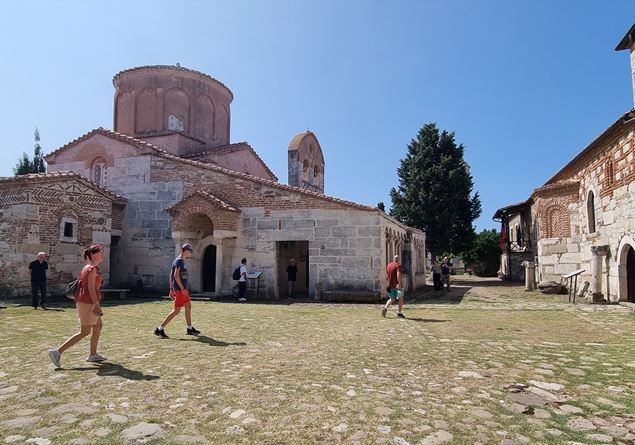“The abuse committed by one of us priests is an incurable wound in those who are the victim, because it is the denial and the shattering of a trust that has become confidence, sharing, opening to deepest intimacy. There are therefore reasons why in this context people are inclined to distrust, skepticism, the scandalized reaction ».
With these words the archbishop of Milan, Monsignor Mario Delpini, commented on some recent news events that involved some Ambrosian priests during the homily of the Chrismal mass Holy Thursday in the Cathedral to which about 800 priests of the diocese were present and in which the holy oils used during the year are consecrated to administer the sacraments.
«We continue to ask ourselves how it is possible that men consecrated to bring the happy announcement of salvation, become a reason for scandal and become a topic to discredit the Church, its priests, and almost consequently the word that is announced. We continue to ask ourselves how it is possible, “said Archbishop,”We continue to propose training and prevention paths. We continue to recall to prudent, conscientious behaviors. We continue to be scandalized by the lightness, by the easyness that is self -ustified, by the lack of perception of the evil that is accomplished towards people who have given confidence, towards the confreres and towards the whole church ».
A recent case that shaken the diocese concerns Don Samuele Marelli, Former director of the Milanese Oratori Foundation (Fom), removed from Seregno last year, on which a canonical trial is underway, which will end shortly, and an investigation by the Monza prosecutor’s office for alleged sexual abuse of minors, which would have occurred when it was the vicar of the “San Giovanni Paolo II” pastoral community of Seregno (Monza) and, in it, responsible for youth ministry.
Here is the full text of the homily by Monsignor Mario Delpini.
1. The fulfillment and disbelief
“Today this writing you listened to has been accomplished.” We are enchanted by the glory that manifests itself. We are surprised by the claim, simple, mild yet indisputable of Jesus who presents himself to his city, to his people and announces the fulfillment of the promises of God. Just today. Right here.
The inhabitants of Nazareth did not celebrate, did not sing the Canticle of Liberation, did not praise God for his wonderful works. Rather, they surrounded the announcement and claims of Jesus of skepticism and even irritation and resentment, which was nothing more than “the son of Joseph”. And Jesus is present in the midst of us and renews his revelation: here I am! Today!
Here you make the promise you have heard, the salvation you have waited for. Just today! Right here! Just for you, for us!
And yet it seems to me that sometimes sad skepticism, the disenchanted presumption, the unruly distraction give birth to the question: who believes “today” in the fulfillment? When we say: “This is my body”, when we say: “Here is the lamb of God”, what amazement, what joy, what gratitude is celebrated in our assemblies?
When we say: “The teacher is here and calls you” what enthusiasm, what haste to come and see can we see?
2. He consecrated me with the anointing and sent me
The stubborn desire of God to save the world and to sow consolation, freedom and relief is accomplished with the presence of Jesus who associates the disciples for him so that they are like him consecrated with the anointing and sent.
The consecration in baptism and grace and the mission of proclaiming this “today” of the unfinished fulfillment are the gift that every baptized receives. The Ministry ordered, our condition as bishops, priests, deacons, has an indispensable mission.
Not alone, not as if we were a privileged caste, but like servants who together with all the Christian people performs the mission of proclaiming this “today” of salvation. If everyone also forgot about it, we are ordered to remember it; If everyone was distracted too, we are ordered to still announce the enchantment, the surprise, the emotion: therefore it’s up to us to say: “Here is the lamb of God!”.
3
The first reading recommends: «You will consecrate these things that will become very holy. You will also grease Aronne and her children and you will consecrate them ».
The anointing that consecrates in the ordered ministry is to announce the “today” of salvation. The anointing makes sacred, who is consecrated. But will the consecrated “holy” be “holy”?
Our church is injured, our presbytery is injured. The scandalous behavior of some of us priests becomes a wound for the whole presbytery, and we are all humiliated and somehow we warn that trust is cracked with all of us.
Even if not every scandalous behavior, which concerns power, sex, the use of money, is a crime pursued by the canonical or civil system, however, it is always a wound for people who expect a word and a life of Gospel, it is a wound throughout the presbytery, throughout the clergy, for the communities.
The abuse committed by one of us priests is an incurable wound in those who are victims of it, because it is the denial and shattering of a trust that has become confidence, sharing, opening to deepest intimacy. There are therefore reasons why in this context people are inclined to distrust, skepticism, the scandalized reaction.
And we continue to ask ourselves how it is possible that men consecrated to bring the happy announcement of salvation, become a reason for scandal and become a topic to discredit the Church, its priests, and almost consequently the word that is announced.
We continue to ask ourselves how it is possible.
We continue to propose training and prevention paths. We continue to recall to prudent, conscientious behaviors.
We continue to be scandalized by the lightness, by the Faciloneria that is self -ustified, by the lack of perception of the evil that is accomplished towards people who have given confidence, towards the confreres and towards the whole Church.
We continue to signal the damage that every abuse represents for the victims, for the communities.
We continue to become aware that the guilty priest or even simply accused of abuse or inappropriate behavior is marked throughout his life.
Our Church has implemented training proposals, opportunities for comparison, publications of indications for correct behavior and for shared vigilance. How can it be that they are of those who snub the proposals, checks, conversion invitations?
4. Yet …
Do you want to know what comforts me in the face of these reasons of desolation? Do you want me to confide in what I find a source of hope for our Church, for our clergy?
Here: my consolation and my encouragement is you. You, the Ambrosian priests, the serious priests, the priests who make the priest with admirable dedication, the priests who in every age are animated by personal and passionate love for Jesus and for peoplefrom the sense of responsibility for the community. The reasons for hope for our Church is you, priests and deacons consecrated for the mission.
We are not perfect and no one is ever subtracted from temptations. But you are a reason to trust because you disdain you for scandals, you get angry about the discredit that hurts us, but you have an inexhaustible reserve of generosity, compassion, creativity.
The reasons for hope for our Church and for the mission of the Church in this time, it is you, the priests who are grateful for the presbyteral fraternity, which build it, which bring the weights of each other, who know how to correct and encourage each other, who pray together.
You are a reason for trust and people know that it can trust you, who need you, that without priests our Church cannot continue its mission according to that unmistakable Ambrosian trait of which I am so proud and grateful. You You are a reason for trust because you continue to be full of amazement and gratitude by welcoming the revelation of Jesus: today it is accomplished, here the promise of God is accomplished.
We are holy not because we are without defects and sins but because the holiness of God continues to attract us to himself and make us united to his Son Jesus.
And in Jesus we receive the joy of being consecrated, which today we are here to celebrate together. And in Jesus we receive our purpose of being holy, in this “today”.










